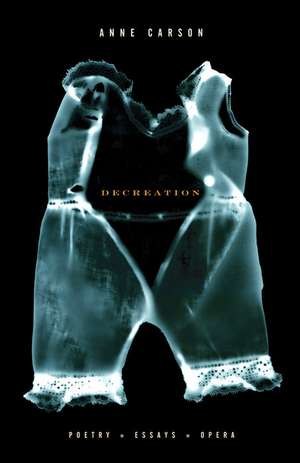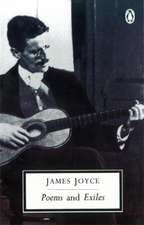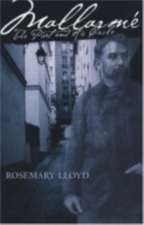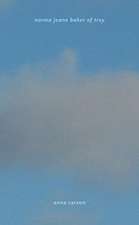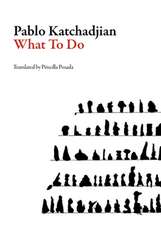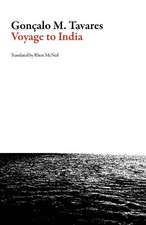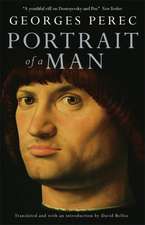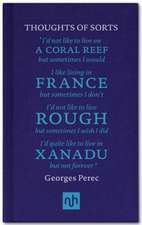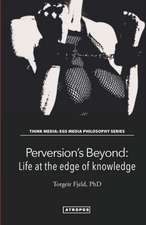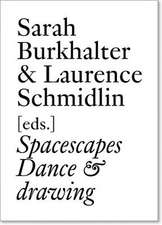Decreation: Poetry, Essays, Opera
Autor Anne Carsonen Limba Engleză Paperback – 30 sep 2006
| Toate formatele și edițiile | Preț | Express |
|---|---|---|
| Paperback (2) | 89.94 lei 24-30 zile | +31.66 lei 4-10 zile |
| Vintage Publishing – 6 sep 2006 | 89.94 lei 24-30 zile | +31.66 lei 4-10 zile |
| Vintage Books USA – 30 sep 2006 | 100.44 lei 3-5 săpt. | +43.57 lei 4-10 zile |
Preț: 100.44 lei
Nou
Puncte Express: 151
Preț estimativ în valută:
19.22€ • 19.99$ • 15.87£
19.22€ • 19.99$ • 15.87£
Carte disponibilă
Livrare economică 24 martie-07 aprilie
Livrare express 07-13 martie pentru 53.56 lei
Preluare comenzi: 021 569.72.76
Specificații
ISBN-13: 9781400078905
ISBN-10: 1400078903
Pagini: 245
Ilustrații: 3 HALFTONES
Dimensiuni: 136 x 203 x 14 mm
Greutate: 0.25 kg
Editura: Vintage Books USA
ISBN-10: 1400078903
Pagini: 245
Ilustrații: 3 HALFTONES
Dimensiuni: 136 x 203 x 14 mm
Greutate: 0.25 kg
Editura: Vintage Books USA
Notă biografică
Anne Carson was twice a finalist for the National Book Critics Circle Award; was honored with the 1996 Lannan Award and the 1997 Pushcart Prize, both for poetry; and was named a MacArthur Fellow in 2000. IN 2001 she received the T. S. Eliot Prize for Poetry–the first woman to do so; the Griffin Poetry Prize; and the Los Angeles Times Book Prize. She currently teaches at the University of Michigan.
Extras
Outwardly His Life Ran Smoothly
Comparative figures: 1784 Kant owned 55 books, Goethe 2300, Herder 7700.
Windows: Kant had one bedroom window, which he kept shut at all times, to
forestall insects. The windows of his study faced the garden, on the the other side of
which was the city jail. In summer loud choral singing of the inmates wafted in.
Kant asked that the singing be done sotto voce and with windows closed. Kant had
friends at city hall and got his wish.
Tolstoy: Tolstoy thought that if Kant had not smoked so much tobacco The
Critique of Pure Reason would have been written in language you could under-
stand (in fact he smoked one pipe at 5 AM).
Numbering: Kant never ate dinner alone, it exhausts the spirit. Dinner guests, in
the opinion of the day, should not number more than the Muses nor less than the
Graces. Kant set six places.
Sensualism: Kant's favourite dinner was codfish.
Rule Your Nature: Kant breathed only through his nose.
From the Hardcover edition.
Comparative figures: 1784 Kant owned 55 books, Goethe 2300, Herder 7700.
Windows: Kant had one bedroom window, which he kept shut at all times, to
forestall insects. The windows of his study faced the garden, on the the other side of
which was the city jail. In summer loud choral singing of the inmates wafted in.
Kant asked that the singing be done sotto voce and with windows closed. Kant had
friends at city hall and got his wish.
Tolstoy: Tolstoy thought that if Kant had not smoked so much tobacco The
Critique of Pure Reason would have been written in language you could under-
stand (in fact he smoked one pipe at 5 AM).
Numbering: Kant never ate dinner alone, it exhausts the spirit. Dinner guests, in
the opinion of the day, should not number more than the Muses nor less than the
Graces. Kant set six places.
Sensualism: Kant's favourite dinner was codfish.
Rule Your Nature: Kant breathed only through his nose.
From the Hardcover edition.
Recenzii
“One of the most interesting gatherings of material that any poet has published within living memory. . . . She is quite unlike any other poet writing today.” –The Economist“Exhilarating . . . Carson takes risks, subverts literary conventions, and plays havoc with our expectations. She is a wonder: an unconventional poet who has a huge following among today’s readers of poetry and whose work has been honored with our most prestigious literary awards . . . When it comes to content, most poetry is boring compared to Carson’s . . . She writes as if every poet, writer, religious thinker, and philosopher who has ever lived is still our contemporary . . . Carson is immensely learned. [Her] prose, with its clarity, compactness, and memorable epigrams, reminds me of Emerson . . . To work with fragments of ancient lyric poems, as Carson does, is to [be] an archaeologist of the invisible whose tools are her learning and her imagination . . . She is interested in her characters in a way that most poets are not. Her language is the language of fiction and the manner in which the stories are told resembles magical realism with its wild imaginings and its carnival atmosphere. As for her subject matter, she writes perceptively and amusingly about men and women in love, their jealousies, their misunderstandings, and the solitude which they are not able to overcome . . . The essays in Decreation are full of marvelous insights . . . What the poet and the authentic thinker share, according to Heidegger, is their ability to wonder at how things exist and to live with that wonder. Carson reminds us that poeticizing in this broader philosophical sense and in the narrow sense of the poetic have always been related. The play of philosophical ideas makes [all] her books worth reading . . . Enthralling, masterful, engaging, stunning, inspired, impressive, profoundly moving, poignant, probing.”–The New York Review of Books“Cool, resolute, smart, and lovely . . . Carson has emerged in the last two decades as a kind of prophet of the unknowable. Decreation may be her loneliest book–a theological treatise and dramatization of how to escape one’s self . . . Carson attempts [this task] with great tenderness, framing the undoing as a work of love that compels one to forsake oneself in order to be something more–truer, more luminous, and also more transient. Carson moves from form to form–poetry, essay, screenplay–and from body to body . . . In the shape traced by Carson’s rapid flight patterns one can almost discern a transcendent emptiness, uninhabitable to more stationary souls.”–The Village Voice
Descriere
In dazzling original poems, essays, screenplay, and libretto gathered here, the author draws on personal experience and the work of others to illuminate "decreation"--the state in which the self dissolves.
